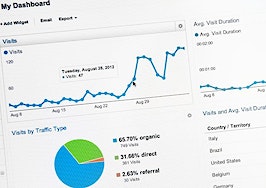- It’s estimated that Google changes its algorithms 500-600 times each year, though most of the changes are minor.
- A backlink is a vote of trust or confidence from one website to another website, which is the foundation of Google's rankings, and thus, crucial to SEO.
- One of the things that will get you dinged on rankings is when all your incoming backlinks have the same pattern.
SEO is crazy — full of ups and downs, unlike any other digital marketing medium.
It’s a specialty that keeps evolving and changing with the latest Google ranking algorithm released.
According to MOZ, it’s estimated that Google changes its algorithms 500-600 times each year, though most of the changes are minor.
MOZ further stated that there have been 141 major Google algorithm changes between the year 2000 and Sept. 23, 2016.
All the Google changes have three effects: some websites lose their rankings, others benefit by getting a boost in rankings and some who did a really good job with their SEO remain unchanged.
Below are the most harmful SEO practices that have fallen victim to Google’s algorithm changes.
Bad practice: Using the same pattern in backlinks
According to wpbeginner, a backlink is a link one website gets from another website.
A backlink is a vote of trust or confidence from one website to another, which is the foundation of Google’s rankings, and thus, crucial to SEO.
The more backlinks a website secures, the more its rankings increase. Backlinks are the catalyst to higher rankings.
Some SEO specialists believe linking as a ranking factor is dead, but I disagree. The only thing that is dead about links is the old way of building backlinks, not backlinks in general.
Because of the strong effect of links on ranking high on Google, webmasters have spammed this technique so badly that Google fought back by releasing Penguin.
Google Penguin is a Google algorithm that is tasked with taking care of spammy backlinks.
One of the things that will trigger Google Penguin is when all your incoming backlinks have the same pattern.
They have the same anchor tests, from the same I.P., from the same source, from user-generated content websites such as forums, do-follow blog comments, directories, etc.
Once Google Penguin detects that a pattern in your backlinks has gone beyond its calculated range, then you are in for major trouble and at risk of being hammered by Penguin.
Google is basically looking for links that come naturally, and links that come naturally don’t look alike or possess the same DNA.
For example: If a thousand people view this post and were asked to read and interpret it in their own words using their preferred medium, there is no way a thousand viewers will all interpret the topic in the same manner and with the same medium.
There would be differences in word choices, length of words and medium when interpreting the topic. Some viewers would have a positive opinion while others would have a negative opinion.
If a thousand viewers all said the same thing the same way with the same medium, then it will be very glaring that something is problematic.
It would be clear that they were all induced to say the same thing, the same way. That is the same way Google will interpret your links and rank accordingly.
How to avoid patterns when building backlinks
- Use different CMS
- Diversify your anchor tests
- Mix-up your do-follow links with a little bit of no-follow links
- Avoid using too many commercial keywords as anchor test
- Make sure your anchor, which contains your target keyword, is not more than 1 percent
Most people are afraid of building backlinks because they feel it’s against Google’s webmasters guidelines, and therefore, Google would find out and penalize them.
But if you are not building backlinks, then you should forget about ranking higher in Google — it won’t happen without building links.
The only thing you should avoid is building links that generate a pattern that will trigger Google algorithms.
Smart link building will give you higher rankings that will not get detected by Google because it looks natural.
Note: Google can’t tell between a link that is bought and a link procured naturally. Google only depends on detecting patterns in your link profile, which will trigger the alarm.
Ibemere Obinna is a real estate seo expert rendering seo service and PPC account mangement for realtors, teams, agents and brokers. He owns realtymarketingtool.






